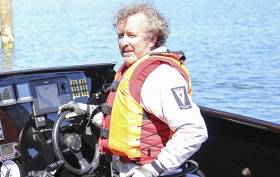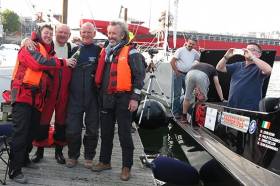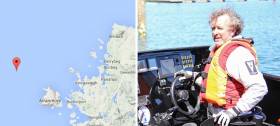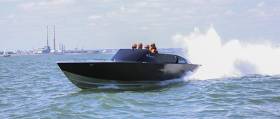Displaying items by tag: Round Ireland Powerboat Record
With his splendid achievement on Sunday of chopping six hours off the established Round Ireland powerboat record time, John Ryan is acclaimed as May’s Powerboat “Sailor of the Month” with a breakthrough which could stand for quite some time.
Ryan and his crew of defending record holder Philip Fitzgibbon, together with Sean MacNamara and Denis Dillon, took full advantage of ideal conditions. The impressive black 40ft Team Hibernia recorded a clockwise circuit from Kinsale with a massive 33% reduction in the standing eighteen hour time. Admittedly Fitzgibbon’s 2009 time was achieved in a RIB of les than 30ft and he continues to hold the under-30ft record. But the John Ryan-led new record of 12 hours 54 minutes and 24 seconds is a very special time indeed, and well worthy of spreading the “Sailor of the Month” awards into an additional category.
Read more: Round Ireland powerboat record
Team Hibernia have smashed the Round Ireland Powerboat Record by taking six hours off the long–standing 2009 time. The high speed voyage which began at 5am this morning was not without its hazards. Were it not for fog and a patch of bad weather, skipper John Ryan believes he could have shaved a further 45 minutes off the seven year record.
Crossing the finish line off Kinsale just after 6pm this evening the four man crew finished in just under 13 hours in a time of 12 hours 54 minutes and 24 seconds.
Crew for the boat included Philip Fitzgibbon, the existing record holder, who has now smashed his own record by over five and a half hours. Fitzgibbon, however continues to retain the record in the under 30–ft category. Also onboard were Sean McNamara and Denis Dillon.
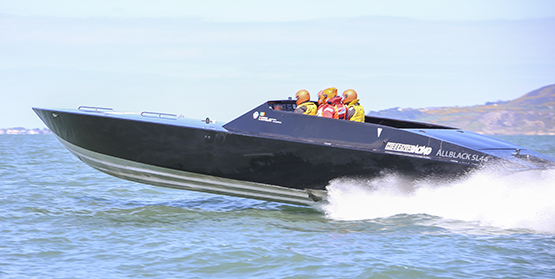
Record breakers – Team Hibernia has set a new Round Ireland Powerboat record. Photo: Afloat.ie
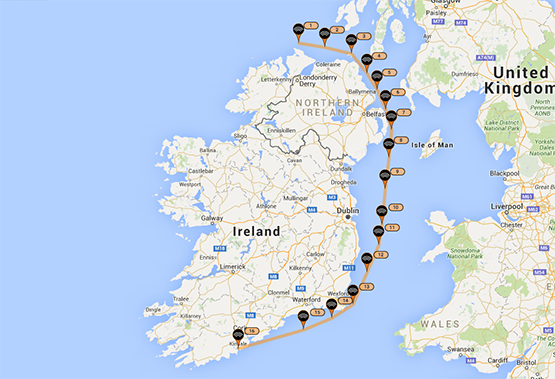
There were tracker problems on the Atlantic coast but there's no denying Team Hibernia's accurate Irish sea track to a new Round Ireland Powerboat record this evening.
There was added drama as they cruised along the south coast this afternoon with a fuel problem but it did not threaten what has been a text book run for the forty–footer that raced at 65 mph for most of the journey.
There was one reufeling stop at Malin Head on the north coast, approximately the halfway stage of the 700–mile circumnavigation. The crew took onboard a massive 1400 litres for the trip south.

Twin diesels powered the craft round Ireland
The boat used is an FPT turbo diesel powered @ 1140 hp, 44' all aluminium, that has a 100 mph top speed with 650–mile range.
A relieved Ryan admits to being 'sore' tonight after nursing a cracked rib for the entire journey, 'It's amazing what eight Nurofen will do', he told Afloat.ie
See all of Afloat's Round Ireland Powerboat coverage here
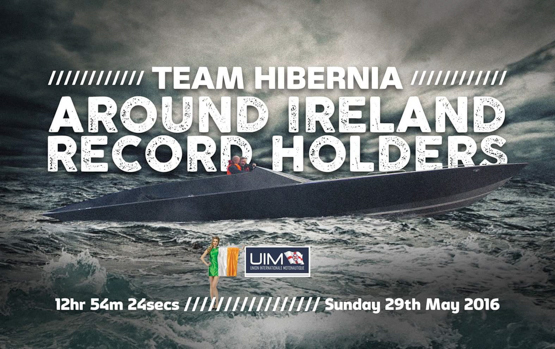
The latest update from Team Hibernia locates the Round Ireland powerboat on course for the sub 19–hour official record. The four man crew, who departed Kinsale this morning, skippered by John Ryan, are off Arranmore Island in County Donegal and preparing for the run across Ireland's north coast. Ryan is aiming to maintain an average speed of 65 mph for the circumnavigation. They are using a spot tracker that reporte their position every few hours. They last reported in at 10.50am off Donegal.
The Wayne Kruse designed mono hull is powered by twin FPT N67 engines.
The scheduled deaprture time from Kinsale was 5am and the time to beat is 18 hours 38 minutes and 50 seconds.
CLICK HERE FOR LATEST
Team Hibernia are scheduled to start their Round Ireland Powerboat record challenge at 0500 on Sunday morning. They will depart Kinsale and head clockwise round Ireland. The 2009 record time to beat is 18 hours 38 minutes and 50 seconds. Read more about the challenge here. The team are targeting a 14–hour time. We will be following the boat on the spot tracker (below). See all updates on one handy link HERE


























